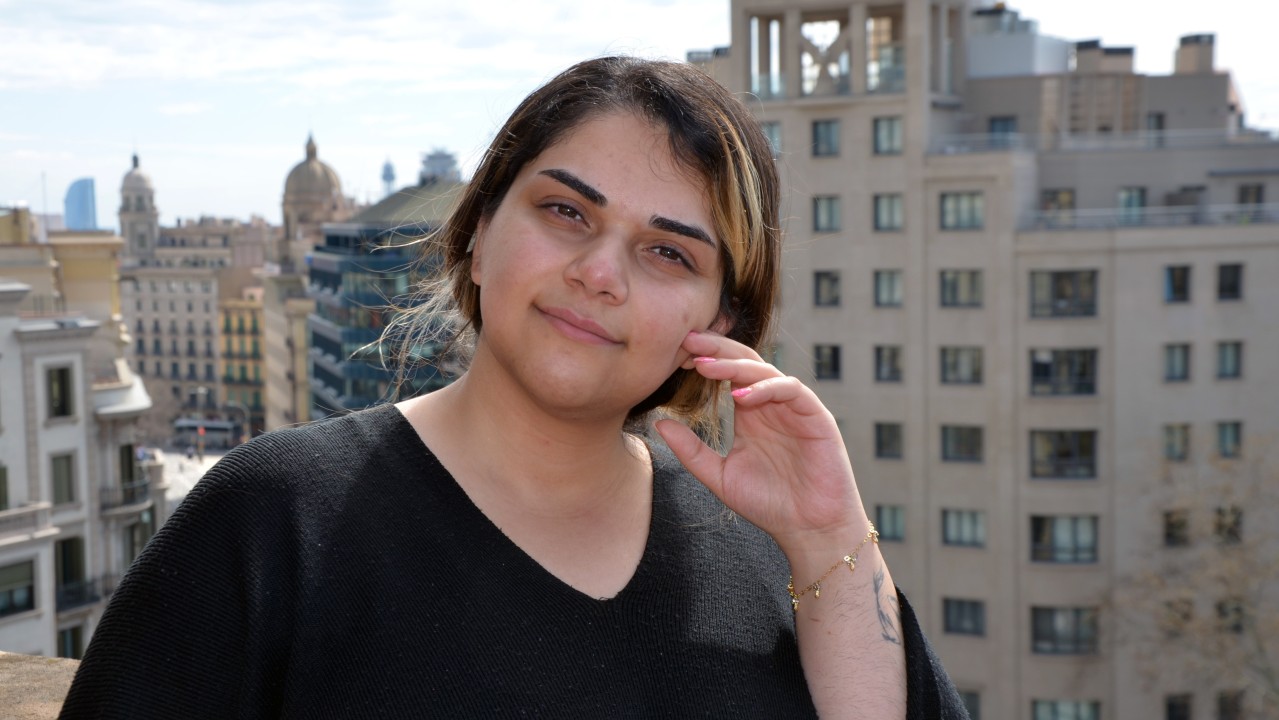
Faranak Nooriankafshgari –Fara, as she prefers to be called– is a cheerful person who enjoys photography, reading science essays and novels of all kinds, listening to music, and cooking. She also loves helping people and trying to understand their psychology, analysing their ways of thinking, which she describes as “a kind of hobby for me.” She plays the piano –having studied at the conservatory for eight years– and has practiced karate and competitive swimming. She also tries to go to the gym regularly to stay fit. Additionally, she is an expert in nail art and proudly shows off her self-decorated nails –pink with shiny dots.
In 2019, she graduated in Medicine from the University of Medical Sciences in Qazvin, a city of about 300,000 inhabitants in northern Iran. The pandemic began while she was working in the city’s two university hospitals. When the health crisis subsided, Fara joined a health centre in a small town near Tehran, where she led a team of around twenty professionals. “I did everything there: caring for pregnant women, children, the elderly, preparing medications for diabetes and hypertension… combining healthcare with management responsibilities.”
It was her interest in management that brought her to Barcelona, where she is now studying for a master’s degree in health and scientific management at the Autonomous University of Barcelona. She is completing her internship at the Innovation Unit of IDIAPJGol. “Before coming to Spain, I spent some time in Italy and was deciding between studying there or here.” In the end, she chose Barcelona for its culture and language, and because her sister has been working for several years at Hospital Clínic.
She hasn’t regretted her decision. “I love the work environment; they’ve welcomed me very warmly, and I’m learning a lot. Here, I have the opportunity to apply what I’m studying at the university.”
AI for triage
Fara is interested in pursuing a professional career in both research project management and healthcare management. Her master’s thesis focuses on developing an artificial intelligence-based system to improve triage in emergency rooms. The goal is to assist nurses and administrative staff in classifying cases according to urgency, ultimately reducing patient waiting times.
“For example, if a patient over 50 with diabetes comes to the emergency room with stomach pain, it’s possible they are having a heart attack.” However, she adds, many triage professionals may lack the knowledge to identify such cases or may be influenced by the patient’s own interpretation. This is where a support system can be useful in determining triage levels more accurately. She envisions this tool even helping patients assess the urgency of their symptoms from home, using a mobile app.
Now, Fara is designing the model for this tool, which she says “is based on managing patients in critical situations, such as during a disaster like the one that occurred in Valencia during the pandemic, or in wartime scenarios.” In such cases, it is crucial to classify patients quickly according to their needs, typically using colour-coded bracelets: “white for non-urgent cases, yellow for uncertain situations, red for urgent cases, and black for the deceased.” The next step in her project will be to define the required resources and budget, and to find a pilot site to test the tool.
Healthcare model
Fara reflects on the differences between the healthcare systems in Iran and Catalonia. “In Iran, healthcare is private, and doctors are under intense pressure from insurance companies. If they miss a cancer diagnosis, they are questioned about why they didn’t catch it. But if they order diagnostic tests and the patient turns out not to have cancer, they are asked why they spent so much money.” While she explains that Iranian healthcare professionals are highly skilled and provide excellent care, “the healthcare administration is chaotic.”
In Catalonia, the system is more regulated, which, she admits, can sometimes make her feel a little lost during her master’s studies, as some aspects of the local system are taken for granted and not explained. “But learning it is up to me. Studying is not a passive activity—it’s something you do by attending classes, but also by reading books, watching documentaries and videos, and searching for information to expand your knowledge. I’m also learning a lot through my work at IDIAP.”
Good organisation
She praises IDIAPJGol for its strong organisation. “Everyone carries out their assigned role,” she says, and adds that “all internal processes are very clear.” She also appreciates the institution’s cultural diversity and variety of perspectives. “There are researchers from Mexico, from Brazil… It’s a very diverse environment, and everything is very well organized.”
Fara also emphasizes the importance of research in primary care, as it addresses issues that are closely related to people’s everyday lives. “Primary care serves the entire population and handles the greatest share of the healthcare burden. The research conducted there has a more direct impact on improving people’s health,” she says.
From Iran, she misses the food, her mother and father, and also her patients. She shows photos they have sent her –drawings from “my children,” as she calls them– expressing how much they miss her.
For now, however, she wants to stay in Barcelona, “a leading place in health, science, and research.”